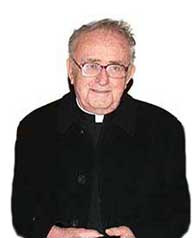Diocesan Guidelines for our Parish Pastoral Councils
INTRODUCTION
Theological and Canonical support for Parish Pastoral Councils
In his document At the Beginning of the New Millennium, Pope John Paul II states that ‘the church of the Third Millennium will need to encourage all the baptised and confirmed to be aware of their active responsibility in the church’s life.’ This responsibility is rooted in the church’s teaching that all the baptised share in the role of Christ the Priest, the Prophet and the King and all the baptised have an equal and active part to play in the life and mission of the church. (3)
Parish Pastoral Councils are structures of participation where the shared responsibility for the mission of the church and the genuine equality and action of all the baptised is both encouraged and sustained in the life of the parish. (4)
It is in this context that Canon 536 on Parish Pastoral Councils should be understood and applied:
- If after consulting the council of priests, the diocesan bishop considers it opportune, a pastoral council is to be established in each parish. In this council, which is presided over by the parish priest, Christ’s faithful, together with those who by virtue of their office are engaged in pastoral care in the parish, give their help in fostering pastoral action.
- The pastoral council has only a consultative vote, and it is regulated by the norms laid down by the diocesan bishop.
Mandate
A Parish Pastoral Council is to be established and operative in each parish in the diocese by the year…
In the case of a parish with more than one Eucharistic community, there are two options:
a. One Parish Pastoral Council with representatives from each community will meet on a regular basis for the good of the entire parish community.
b. Where appropriate each Eucharistic community will have its own co-ordinating group which will meet on a regular basis to serve the needs of the local community. Representatives from each Eucharistic community would form an overall Parish Pastoral Council and would gather at agreed times during the year.
Parish Guidelines
The general framework provided by this document will assist each pastoral council to fashion its own specific guidelines. Whilst taking into account the special needs of the individual parishes the Parish Pastoral Council guidelines should remain faithful to the basic nature of Parish Pastoral Councils outlined in the documents of the Second Vatican Council and the Code of Canon Law.
The guidelines are to be submitted to the diocese for approval; (The relevant diocesan office would be named here). They are to be reviewed every five years by the Parish Pastoral Council and resubmitted for approval.
PURPOSE OF PARISH PASTORAL COUNCILS
The vibrancy of God’s life and love is manifested when all the baptised collaborate in the mission of Christ. Parish Pastoral Councils are leadership structures that enable priests and people to work together to build up dynamic Christian communities that are characterised by faith, evangelisation, worship and service. To this end they discern what is best for the parish in light of the gospel, the church’s teaching and what the Holy Spirit is saying through the People of God. Their major tasks involve:
Reflection & Planning
Discerning the needs of the parish community and involving the whole parish in response to the needs.
Animation
Enabling the baptised to discover their call as disciples of Christ by discerning the gifts of the parishioners and developing them through the provision of training and on-going formation.
Action
Providing structures that will marry the needs of the parish with the gifts and resources in the parish.
Communication
Ensuring that effective dialogue takes place within the parish, the diocese and the wider community.
Evaluation
Reviewing the life and activities of the parish so that parishioners might have
a sense of proceeding towards bringing about the reign of God.
The Finance of the Parish is catered for by the Finance Committee which is obligatory by Canon Law.
MEMBERSHIP
Selection Process
Parishes must decide upon a method of prayerfully selecting members that is appropriate to their own particular situation. Some of these options include:
• Nomination by parishioners followed by a process of discernment
• Election by the parish community
• Selection of representatives from parish organisations
• Selection by the parish priest in consultation with the parish curates and/ or with the present council members
.
Criteria for membership
Members shall be baptised Catholics who participate in the life and worship of the parish and are available to attend a minimum of half the meetings in the space of one year. .
Representation
A broad representation of the whole parish is the ideal; it is essential that the members of the council undertake to be representative of the whole community and focus on what is best for the whole parish, not individual parish groups.
Formation
Prayer, reflection and skills training are of paramount importance to ensure the Parish Pastoral Council is effective. On-going formation should be provided for every member of the Pastoral Council.
Period for Membership
Elected and appointed members of the Parish Pastoral Council are to have terms of office. The terms should be no shorter than one year and no more than four years.
Depending on the length of the terms, the parish might include the possibility of reappointment. If this is the case then it needs to be stated how many times the person may be reappointed – the period of time in-between appointments also needs to be stated.
The parish might consider having staggered terms to maintain a minimum of stability and efficiency.
Casual Vacancies
The Parish Pastoral Council itself may fill any casual vacancy by invitation; the length of service of the person who fills the vacancy needs to be outlined.
Size
For a meeting to run efficiently and act effectively the Parish Pastoral Council should consist of between 10 and 15 members.
Composition of the Parish Pastoral Council
The guidelines for the Parish Pastoral Council shall state the number of:
.
• Ex officio members,(5) which should not exceed 40% of the total membership
• Members selected by the parish in general
• Parishioners who are appointed because of their expertise in particular fields
ROLES
At least four officers should be mentioned in the parish guidelines: president, chairperson, secretary and diocesan contact person.
President
The parish priest – or when there is no priest, the parish co-ordinator appointed by the diocese – has been entrusted with the care of the parish by the bishop. He convokes the meetings and is the president of the council (6)
Chairperson
The chairperson is elected by the members of the council for a determined period of time with an option for renewal The role of the chairperson is to prepare the agenda with the president and the secretary and to facilitate the meetings of the Parish Pastoral Council Parishes might wish to appoint a Vice Chairperson to assist the Chairperson.
Secretary
The secretary is responsible for keeping a record of the meetings of the Parish Pastoral Council and for circulating relevant material to the council members. The secretary could be elected for a renewable term of office; alternatively, parishes might decide to appoint a secretary who is not a member of the council as the task may limit participation in a meeting.
Diocesan Contact Person
The diocesan contact person liaises between the parish and the diocese through the appropriate diocesan office and is elected for a renewable term of service. The name of the contact person will be forwarded to the appropriate diocesan office.
Responsibilities of all members
Responsibilities will differ according to the needs of the individual parishes but in general the members of the council will be required to:
.
• Attend the meetings of the Parish Pastoral Council on a regular basis
• Participate in the deliberations of the council
• Assist where possible with the implementation of Parish policies
• Grow in knowledge and awareness of what is happening in the parish
• Take part in the training / induction of all new council members and avail of on-going formation
MEETINGS
Frequency
The guidelines of the Parish Pastoral Council should specify the frequency of the meetings. Some parishes may need to meet monthly while others may choose less frequent meetings. The minimum requirement for meeting is five times a year.
Process
The collaboration between the Parish Priest and the Parish Pastoral Council is integral to each stage of the parish decision-making process. In virtue of his office, the Parish Priest presides over and ratifies all stages of the process leading up to and including final choices and implementations. This collegial process respects the authority of the Parish Priest who takes into account the integrity, expertise and prayerful deliberations of the members of the council.
Agenda
The agenda for each meeting will be finalised by the secretary, chairperson and the president of the council. Ideally the agenda should be circulated to council members in advance of the meeting, together with any notes or other relevant material required. Minutes of the meeting will be circulated at an agreed time after the meeting has taken place.
Prayer
The unique nature of the Parish Pastoral Council demands that a period of time be set on the agenda for prayer and reflection during the meetings.
Quorum
Parishes must determine the minimum number of members who must attend the meeting and state which members are to be included. In general the minimum number of members required is one over one half. A legitimate quorum must include the parish priest or his named delegate.
COMMITTEES
The Parish Pastoral Council is primarily concerned with promoting action through pastoral planning; it must also provide the necessary means for action. This may at times involve setting up standing committees andad hoc committees.
Standing Committees
These are permanent in nature and generally facilitate some form of ministry or organisation in the parish. The guidelines should state their relationship with the council.
Ad Hoc Committees
Ad hoc committees (working groups) may be set up for specific purposes and with a definite time limit, e.g. planning a centenary celebration for the parish.
DIOCESAN SUPPORT
The diocese is committed to providing resources, training and ongoing formation at diocesan and deanery level; parishes are strongly encouraged to avail of these provisions.

